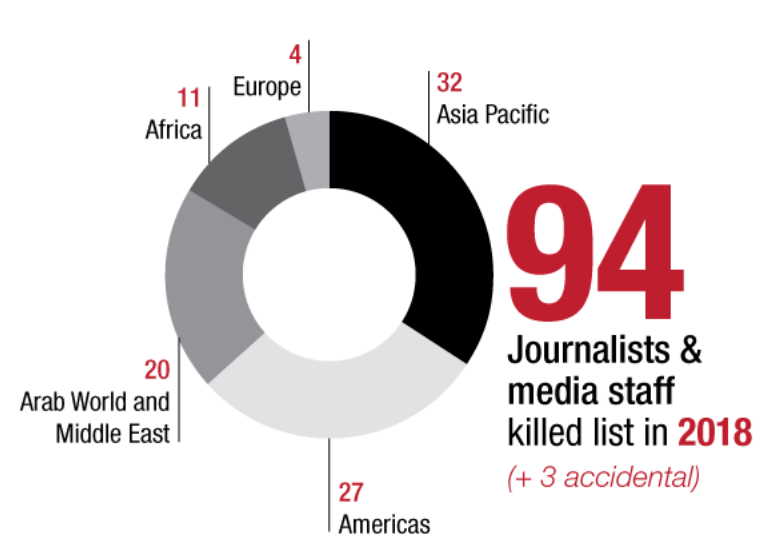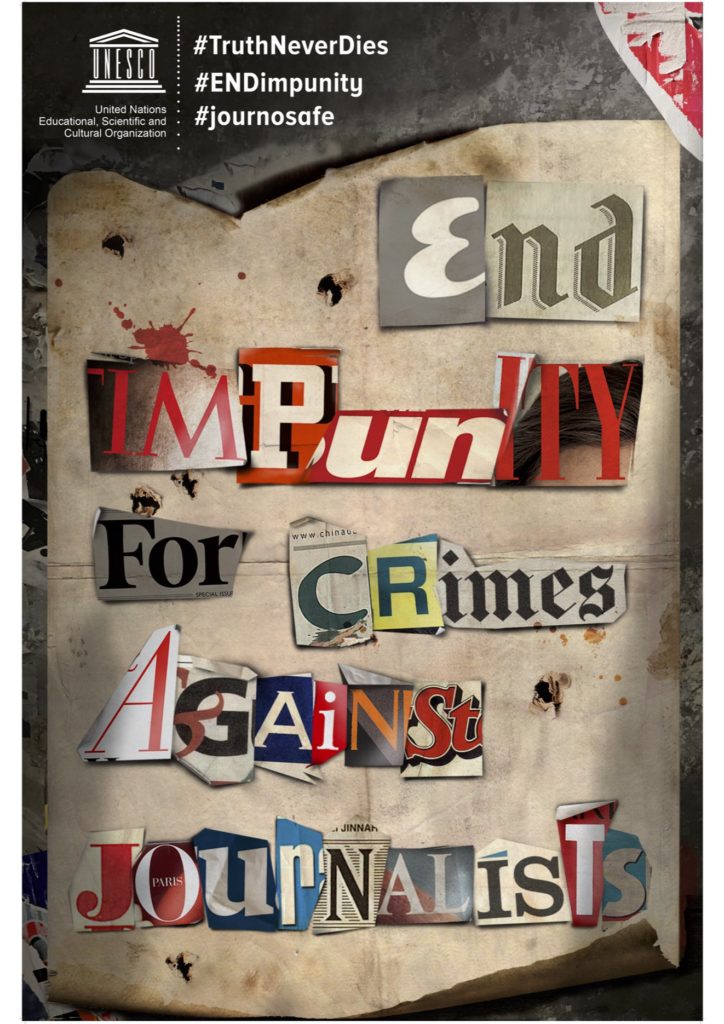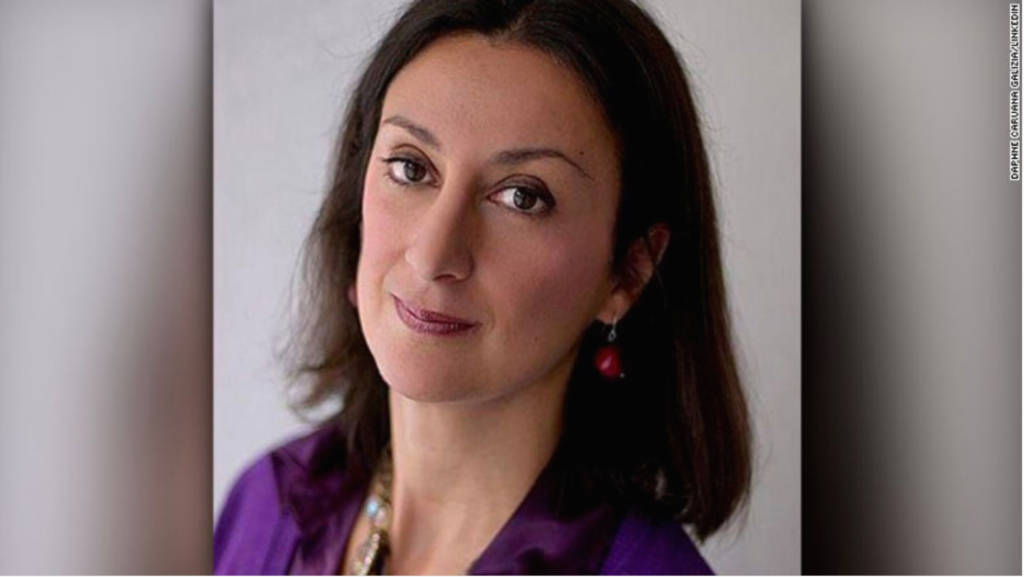The EU reaffirms its commitment to protect journalists and pays tribute to those who lost their lives for reporting the news.
According to official statistics, over 1.000 journalists were killed in the world in the past 12 years. Not only in faraway warzones, but also – and predominantly – at home, even in peaceful western countries. They were investigating issues that others wanted to keep hidden. Nine out of ten cases remain unresolved.

On November 2, the International Day to End Impunity for Crimes against Journalists, the EU reaffirmed its commitment to protect journalists and support media pluralism worldwide, and pays tribute to those who lost their lives in the exercise of their profession.
“Freedom of expression, in all its forms, is the very essence of democracy. Only with a thriving, free and independent media landscape, we can hold governments, businesses and society at large accountable. And precisely for this fundamental principle, far too often, journalists are attacked, persecuted, harassed, or intimidated for carrying out their work”, the EU High Representative Federica Mogherini stressed in a declaration on behalf of the European Union. “Time and again, governments fail to protect journalists, hesitate to prosecute perpetrators or even perpetrate the crimes themselves”.
In 2018 alone, 94 journalists and media staff were killed in work-related incidents, as reported by the International Federation of Journalists (IFJ). Hundreds more have been wrongfully imprisoned, some of them without ever having been tried in a court.
“Only last month we commemorated the killing of Saudi national Jamal Khashoggi, whose case still awaits court handling, and the murder of Maltese journalist Daphne Caruana Galizia in the midst of Europe, proving that no region of the world is immune to such crimes”, Mogherini said.

Contrary to popular belief, most journalists are not murdered or wounded far away from home, in the heat of war coverage, but suffer violence in their immediate surroundings. 93% of killed journalists were local journalists investigating local stories, according to #KeepTruthAlive, a campaign developed by UNESCO to mark the date.
In December 2013, the United Nations General Assembly proclaimed 2 November as the International Day to End Impunity for Crimes against Journalists (Resolution A/RES/68/163). The chosen date commemorates the assassination of two French journalists in Mali on 2 November 2013. The Resolution urges the Member States to implement measures countering the current impunity for crimes against journalists, a reality that is still far from changing.
“When journalists are targeted, societies as a whole pay a price. Without the ability to protect journalists, our ability to remain informed and contribute to decision-making is severely hampered. Without journalists able to do their jobs in safety, we face the prospect of a world of confusion and disinformation.” — UN Secretary-General António Guterres

What is the EU doing to protect journalists?
The EU is a leading global actor in the protection of journalists and the defence of free and independent quality journalism, an essential ingredient of any fully-fledged democracy.
The EU-funded mechanism for Human Rights Defenders, a network that delivers fast and specific EU response to human rights activists, is ready to protect journalists facing imminent danger or threats worldwide.
Threats to media pluralism in the EU and neighbouring countries are consistently monitored and measured by the Centre for Media Pluralism and Media Freedom (CMPF)’s Media Pluralism Monitor. On top of that, in 2019 the European Commission has earmarked a budget of more than €8 million to support projects geared at promoting quality journalism and cross-border cooperation between media professionals, as well as funding cross-border investigative journalism. Source : European Union External action
Countries with the highest numbers of media killings in 2018 Afghanistan:16; Mexico:11; Yemen:9; Syria:8; India:7; Pakistan:5; Somalia:5; USA:5; Philippines:3; Ecuador:3; Brazil:3; Colombia:2; Palestine:2; Guatemala:2.
On the occasion of the International Day to End Impunity for Crimes against Journalists, a panel discussion on “Safety of Journalists and Ending Impunity in Conflict Situations” was co-organized by the Permanent Mission of Greece to the United Nations, and by the United Nations Educational, Scientific, and Cultural Organization
COUNCIL OF EUROPE : « MALTA MUST ESTABLISH ACCOUNTABILITY FOR THE MURDER OF DAPHNE CARUANA GALIZIA »

“The Government of Malta remains far behind in its obligation to ensure that investigations in the murder of Daphne Caruana Galizia are conducted in a prompt, effective, independent and impartial manner,” said in a joint statement Dunja Mijatović, Council of Europe Commissioner for Human Rights, Harlem Désir, OSCE Representative on Freedom of the Media, David Kaye, UN Special Rapporteur on the Right to Freedom of Opinion and Expression, and Agnes Callamard, UN Special Rapporteur on extrajudicial, summary or arbitrary executions.
“Two years have passed. No convictions, no trials of ringleaders and masterminds. On the contrary, posthumous libel suits continue to target the family of Daphne Caruana Galizia and makeshift memorials of her are frequently removed. This only adds to the sorrow and pain of her family and loved ones.
To date, three men have been charged with the murder; after almost 20 months, they were finally ordered to stand trial. However, ending impunity requires holding accountable not only those who carried out the murder, but everyone complicit in it, including the masterminds behind it. Those masterminds remain unaccountable for now.
The tragic anniversary of her murder reminds us of the costs borne by journalists, particularly those who seek to hold the powerful to account. Investigative journalism embodies the central values of access to information and robust reporting and debate to democratic society. Journalism, as Daphne Caruana Galizia and countless others around the world have practiced it, is a service in the public interest. Attacks on journalists not only deny their right to life. They deny the public’s right to know.

On the anniversary of the murder of Daphne Caruana Galizia that shook people in Europe and beyond, we urge the Government of Malta to uphold its obligations to respect and ensure freedom of expression and press freedom, and to investigate the murder of Daphne Caruana Galizia, in accordance with the standards of international human rights law, such as those of the International Covenant on Civil and Political Rights and of the European Convention on Human Rights.
We call on the authorities to do their utmost and to speed up the process of establishing accountability and shed the full light on this horrendous crime. This must become Malta’s top political priority.
The echo of the explosion that killed Daphne Caruana Galizia is still ringing in our memory with the ultimate question: When will justice be served, and bring a little comfort to her loved ones? The Government of Malta owes an answer to Daphne, her family, Maltese society and all journalists around the world.”


